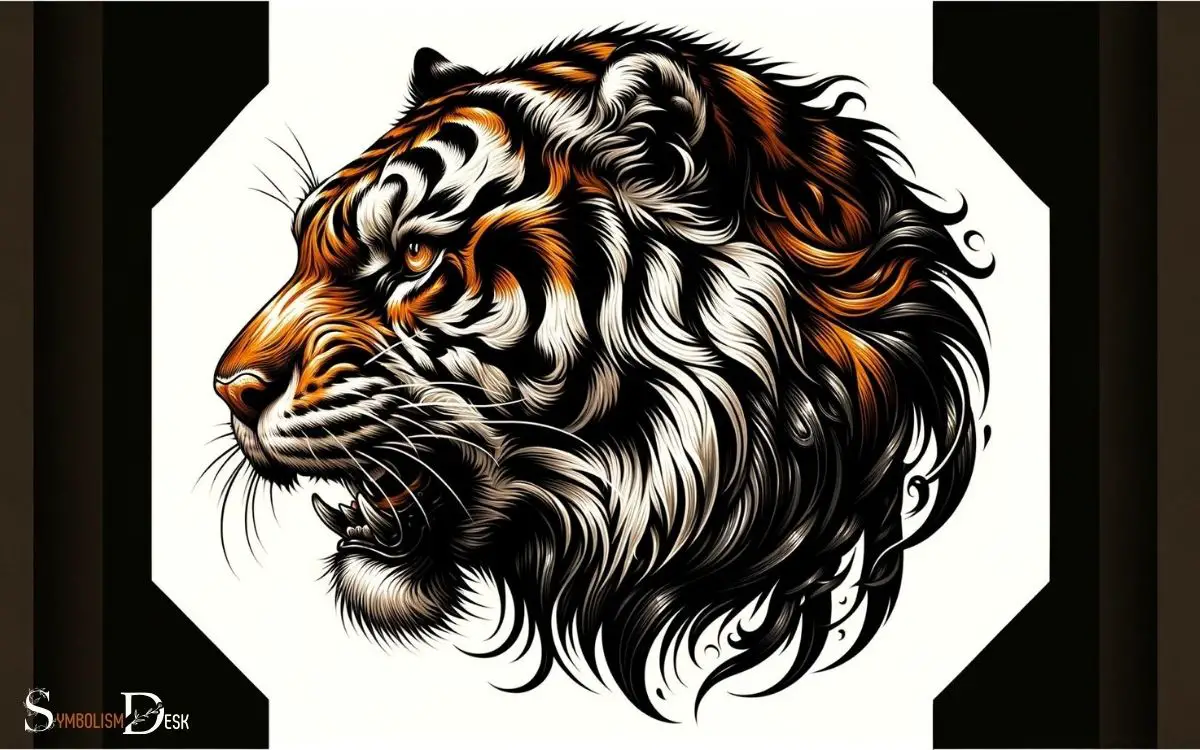What Does a Tiger Tattoo Symbolize? Power!
A tiger tattoo symbolizes strength, power, courage, freedom, and independence. It may also represent passion, ferocity, and sensuality. In various cultures, tiger tattoos can signify good luck, protection, and spiritual guidance.
Tiger tattoos are rich in symbolism and can carry different meanings across cultures:
- Strength and Power: The tiger is one of the most powerful predators in the wild, symbolizing physical strength and personal power.
- Courage: As a fearless animal, it represents the bravery required to overcome challenges.
- Freedom and Independence: Tigers are solitary creatures, often symbolizing a free spirit and independence.
- Passion and Sensuality: Their intense energy can represent raw emotions and primal instincts.
- Good Luck and Protection: In some Eastern cultures, tigers are believed to ward off evil spirits and bad luck.
- Spiritual Guidance: They can also be seen as spiritual guides, leading individuals on their life paths.
Choose a tiger tattoo design for a powerful representation of your inner strength and fierce spirit.
Dive into the significance of tiger tattoos, symbols of formidable might and valiant hearts. These tattoos have ancient roots and have evolved in meaning, representing robustness, authority, and daring.
Explore the esteemed history, diverse cultural interpretations, and safeguarding symbolism behind tiger tattoos, as they stand as a testament to boldness in the tattoo arts.

Key Takeaway
Historical Significance of Tiger Tattoos
Tiger tattoos have frequently held historical significance in various cultures around the world, symbolizing power, strength, and protection.
- In many Eastern cultures, tigers are revered for their strength and prowess, and as a result, tiger tattoos are often associated with bravery and power.
- In Chinese culture, the tiger is one of the twelve zodiac animals and is considered a symbol of protection and warding off evil spirits.
- In Hindu mythology, the goddess Durga is often depicted riding a tiger, representing her power and ferocity.
- Additionally, in Korean folklore, tigers are seen as guardians that protect humans from harm.
These cultural representations have contributed to the enduring popularity of tiger tattoos and their association with historical significance in various societies.
Cultural Meanings and Representations
Cultural representations of tigers as symbols of power and protection have been influential in shaping the meanings associated with tiger tattoos in various societies.
In many cultures, the tiger is revered for its strength, courage, and prowess, leading to its depiction as a guardian and a source of authority.
Below is a table showcasing the cultural meanings and representations of tiger tattoos in different societies:
| Culture | Meaning | Representation |
|---|---|---|
| Chinese | Power and strength | Guardian of the West |
| Japanese | Courage and luck | Protector from harm |
| Indian | Royalty and ferocity | Symbol of divine energy |
These cultural representations highlight the diverse significance of tiger tattoos and the deep-rooted symbolism they hold across various societies.
Symbolism of Strength and Power
The representation of strength and power in tiger tattoos is deeply rooted in various cultural beliefs and traditions, reflecting the revered status of the tiger as a symbol of authority and fortitude.
In many cultures, the tiger is seen as a creature of great strength and power, embodying qualities that are admirable and aspirational.
The image of a tiger in a tattoo often serves as a reminder of these attributes, inspiring the individual to harness their own inner strength and courage.
The symbolism of strength and power in a tiger tattoo can also convey a sense of fearlessness and resilience. It’s a visual representation of the wearer’s ability to overcome challenges and emerge victorious.
Through the depiction of a tiger, individuals seek to embody these powerful traits and carry them with pride.
Tiger Tattoos as a Representation of Courage
Representing bravery and valor, tiger tattoos exude an aura of fearlessness and determination. In many cultures, the tiger is revered as a symbol of courage, and getting a tiger tattoo can serve as a powerful representation of one’s inner strength.
The image of a tiger, with its piercing eyes and powerful stance, conveys a message of resilience and bravery.
People often choose to adorn themselves with tiger tattoos to embody the courageous and bold characteristics associated with this majestic animal.
The tattoo serves as a constant reminder to face challenges with fortitude and to approach life with unwavering courage.
For those seeking to embody and display bravery and valor, a tiger tattoo can be a poignant and meaningful symbol of their fearless spirit.
Protective and Fearless Associations
The tiger tattoo is often associated with a sense of protection and fearlessness. It symbolizes strength and resilience, representing the wearer’s ability to overcome challenges and adversity.
This fierce animal embodies a fearless attitude and serves as a protective guardian for those who wear its image.
Symbol of Strength
Exuding a sense of power and resilience, a tiger tattoo embodies strength, protection, and fearlessness.
The tiger, as a symbol of strength, is often depicted in tattoos to convey an individual’s inner fortitude and ability to overcome challenges.
Tigers are revered for their physical prowess and unwavering determination, making them a potent symbol of protection and courage.
In many cultures, the tiger is believed to possess a potent and protective energy, capable of warding off evil and providing a sense of security.
Individuals who choose to ink a tiger onto their skin often do so to reflect their own fearless and indomitable spirit.
This association with strength and protection makes the tiger tattoo a popular choice for those seeking to express their inner resilience and unwavering bravery.
This representation of strength seamlessly transitions into the subsequent section about how the tiger tattoo represents courage and power.
Represents Courage and Power
Often associated with bravery and strength, a tiger tattoo symbolizes courage and power, reflecting the wearer’s fearless and protective nature.
The tiger, as a symbol of courage and power, holds deep significance for many individuals seeking to convey these traits through body art.
- Tigers are often seen as symbols of protection and fearlessness, representing the wearer’s ability to confront and overcome challenges.
- The image of a tiger in a tattoo can serve as a constant reminder of one’s inner strength and resilience, inspiring the wearer to face adversity with courage and determination.
- The tiger’s commanding presence and ferocity in the wild also embody the idea of power, signifying the wearer’s ability to command respect and authority in their own lives.
- This association with power can also signify the wearer’s capacity to protect and defend themselves and those they care about.
Modern Interpretations and Popularity
Modern interpretations of the tiger tattoo symbolize power and strength, which has contributed to its enduring popularity.
Additionally, the tiger has become a recurring motif in contemporary art, reflecting its cultural significance and resonance in the modern world.
These modern interpretations have further solidified the tiger tattoo’s position as a timeless and impactful symbol in the realm of body art.
Tiger as Power Symbol
Tiger tattoos have become a popular choice for individuals seeking to convey strength and dominance through body art.
In contemporary society, the tiger is often seen as a symbol of power and resilience, leading to its widespread popularity in tattoo designs.
- Modern Interpretation: The tiger is often associated with qualities such as courage, authority, and assertiveness, making it a compelling symbol for those who wish to project strength and confidence through their tattoos.
- Masculine Symbolism: Many men opt for tiger tattoos as a way to exude masculinity and vigor, embracing the fierce and unyielding nature of the animal.
- Popularity: The appeal of tiger tattoos has surged in recent years, reflecting a growing societal appreciation for the symbolism of power and tenacity that the tiger embodies.
This significance has cemented the tiger’s status as a prominent power symbol in contemporary tattoo culture, influencing the designs and meanings chosen by individuals.
Tiger in Contemporary Art
The enduring significance of the tiger as a symbol of power and resilience is frequently portrayed in contemporary art, reflecting its widespread popularity in various artistic expressions.
In modern interpretations, the tiger is often depicted in bold and vibrant ways, capturing its strength and majesty.
Contemporary artists use various mediums such as paintings, sculptures, digital art, and street art to showcase the tiger’s symbolic representation.
The tiger’s presence in pop culture, including music, fashion, and advertising, further demonstrates its contemporary relevance. Its image is often utilized to convey messages of courage, determination, and independence, resonating with today’s audience.
The tiger’s iconic status in contemporary art not only pays homage to its traditional symbolism but also serves as a powerful and timeless emblem in the modern world.
Conclusion
The tiger tattoo symbolizes courage, strength, and power, embodying the fearless and protective nature of the majestic creature.
Its historical and cultural significance, along with its modern popularity, make it a timeless symbol of bravery and resilience.
Like the tiger itself, this tattoo roars with meaning and leaves a lasting impression on those who wear it.







